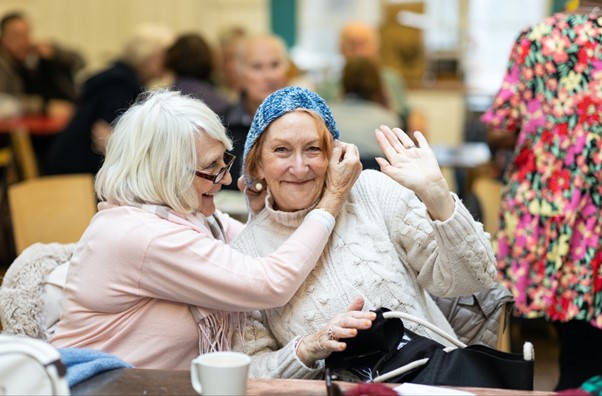Dementia is a significant and growing health and aged care issue in Australia that has a substantial impact on the health and quality of life of people with the condition, as well as their family and friends [1]. With almost 10 percent of Australians over the age of 65 suffering from this condition and with currently no cure for dementia, it is very important to recognise the early signs and understand the strategies that can assist in maintaining independence and quality of life for as long as possible.
What is Dementia?
Dementia is not one specific disease, but rather it describes a collection of symptoms that are caused by disorders that affect the brain. Dementia affects thinking, behaviour and the ability to perform everyday tasks. This decline in cognitive function is beyond what is considered a normal part of ageing, as it interferes with the person’s normal social or working life.
In 2022, the Australian Institute of Health and Welfare estimated that there were 401,300 Australians living with dementia. This is equivalent to 15 people with dementia per 1,000 Australians, which increases to 84 people with dementia per 1,000 Australians aged 65 and over, accounting for nearly 10 percent of this population group [1]. Furthermore, nearly two-thirds of Australians with dementia are women.
As our population ages, it is predicted that the number of Australians with dementia will more than double by 2058 to 849,300 people (533,800 women and 315,500 men) [2].
Early Signs and Symptoms
Recognizing the early signs of dementia is pivotal for timely intervention. Potential indicators include:
● Memory loss
● Difficulty with familiar tasks
● Confusion about time and place
● Trouble with language
● Poor judgement
● Withdrawal from social activities
● Changes in mood and personality
Early detection can lead to more effective management and improved quality of life.
Diagnosis and Assessment
Accurate diagnosis of dementia involves a comprehensive evaluation. Medical history, physical exams, cognitive tests, and brain imaging may be conducted to rule out other conditions and pinpoint the underlying cause of cognitive decline. An early and accurate diagnosis facilitates appropriate care planning.
Living with Dementia
Individuals living with dementia face unique challenges in their daily lives. Creating a dementia-friendly environment involves minimising distractions, providing clear communication cues, and ensuring safety.
Establishing routines, engaging in mentally stimulating activities, and fostering social connections can help maintain cognitive function and promote a sense of purpose.
Impact on Individuals and Families
The impact of dementia extends beyond the individual diagnosed. Family members and caregivers often shoulder a significant emotional, physical, and financial burden. Witnessing a loved one’s cognitive decline can be distressing, and the challenges of caregiving can lead to burnout and strained relationships. In 2022, it was estimated there were between 137,600 and 354,200 unpaid carers of people with dementia who live in the community. In addition, 41% of primary carers of people with dementia in 2018 reported that they frequently felt weary or lacked energy according to the AIHW [3].
Caring for Individuals with Dementia
Caregivers play a pivotal role in the lives of those with dementia. Establishing a structured routine, managing medications, assisting with activities of daily living, and promoting emotional well-being are essential aspects of caregiving.
Importantly, seeking respite care and joining support groups can provide caregivers with the necessary tools and emotional support to avoid burnout and undue strain.

Treatment and Intervention
While there is no cure for most forms of dementia, various treatments and interventions aim to manage symptoms and enhance quality of life. Medications can temporarily alleviate cognitive and behavioural symptoms. Non-pharmacological approaches such as cognitive stimulation, art therapy, music therapy, and reminiscence therapy offer alternative avenues for engagement and connection. Always discuss alternative medical options with your medical practitioner.
Promoting Brain Health
While dementia is not entirely preventable, certain lifestyle choices can contribute to brain health and potentially reduce the risk of cognitive decline and play a role in supporting cognitive function:
1. Regular physical exercise
2. A balanced diet rich in antioxidants and omega-3 fatty acids
3. Mental stimulation through puzzles and learning
4. Maintaining social connections

Support and Resources
There is a large range of resources available for individuals, families and carers who are navigating the challenges of dementia. Support groups, both in-person and online, provide a space to share experiences and seek advice.
Dementia Australia
- Call their 24 hours National Dementia Helpline on free call 1800 100 500
- Click here to use their online service enquiry/referral request form
- Browse and register for their education programs specifically designed for people living with dementia
COTA NSW
- Call us to for support and guidance on our free call number on 1800 449 102
Conclusion
Dementia is a complex and challenging condition that requires a comprehensive approach encompassing awareness, understanding, and support. By fostering a compassionate and educated society, we can collectively strive to improve the lives of individuals living with dementia and their caregivers.
References
[1] [2] [3] Australian Institute of Health and Welfare (2023) Dementia in Australia, AIHW, Australian Government, accessed 16 August 2023.
